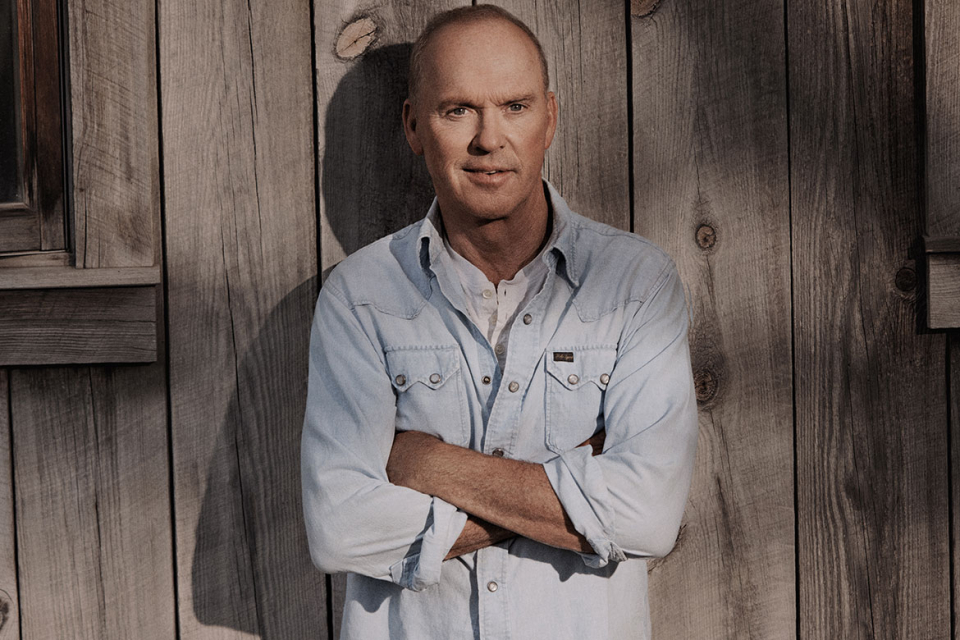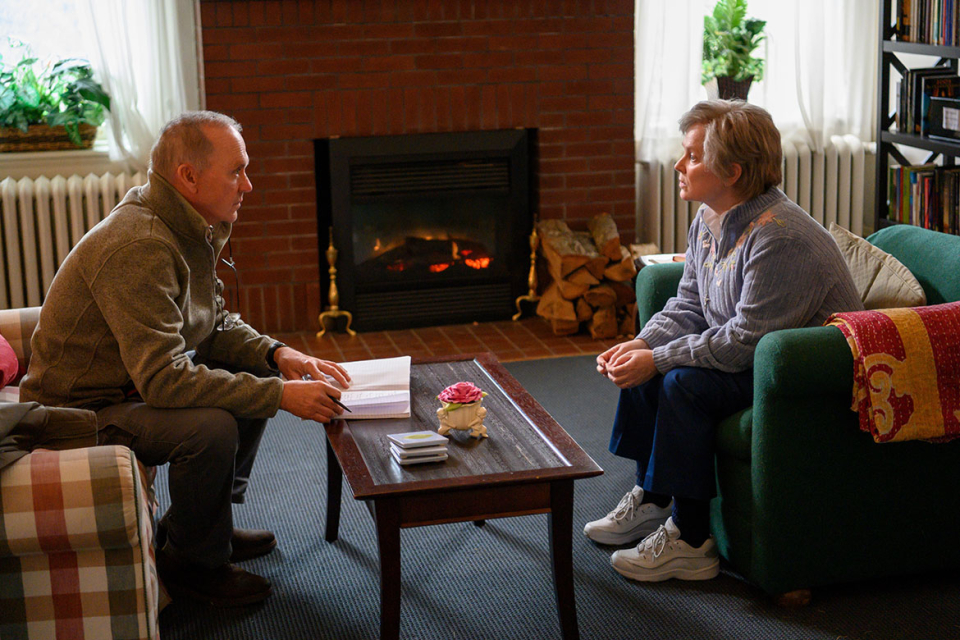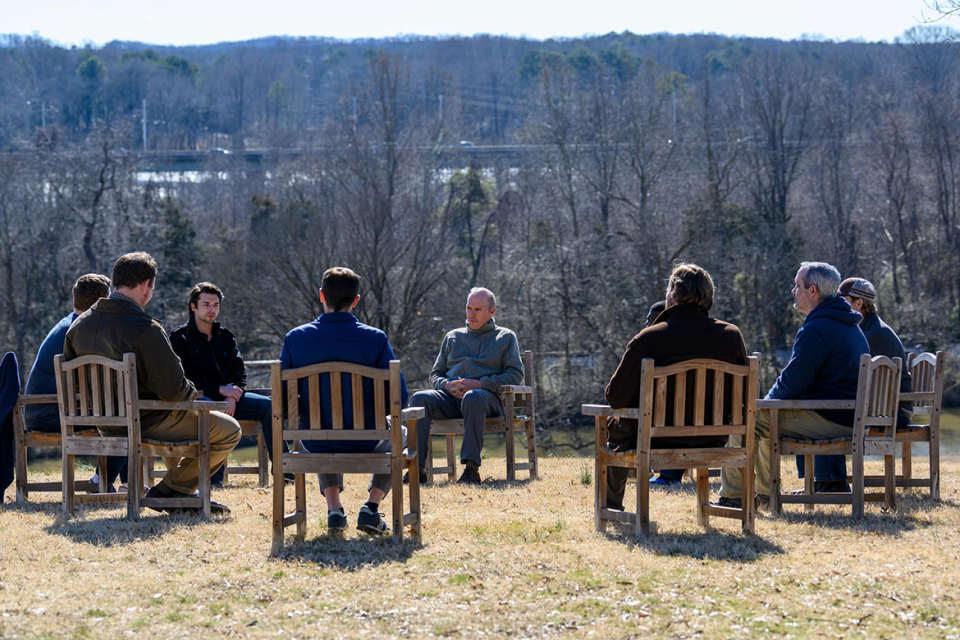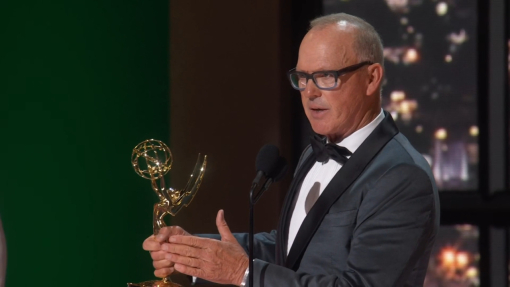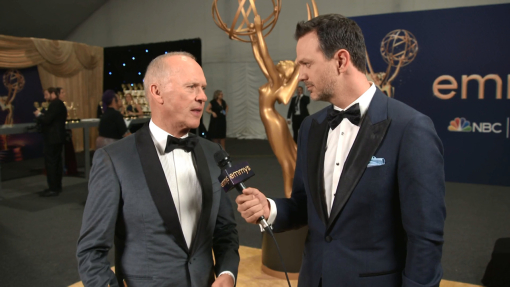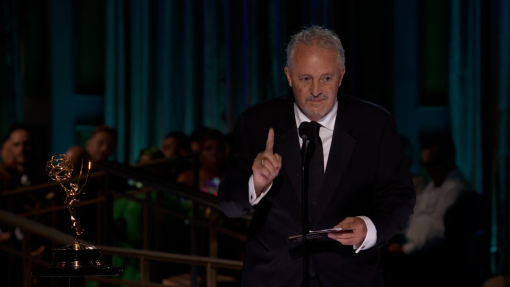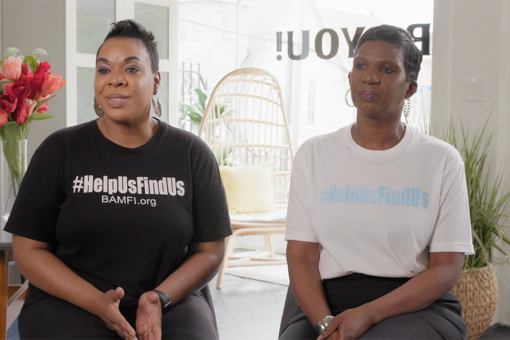Early in the first episode of Hulu's limited series Dopesick, Michael Keaton, as small-town doctor Samuel Finnix, regales a patient with a fishing anecdote that involves his "good luck" rooster tail lure.
In real life, Keaton — who splits his time between Los Angeles and his 1,000-acre Montana ranch — is an avid fly fisherman. But that's not how he saw Finnix. "He's more of a lure guy," Keaton observes. "Fly fishing requires a lifestyle where you have to invest time. Finnix doesn't have that kind of time; he doesn't have that luxury."
Keaton has long brought such attention to detail to his craft. Now in the sixth decade of a career that spans more than ninety roles on television and in film, he remains the consummate Everyman, instantly relatable whether playing a salesman or a superhero.
His gallery of fictional characters (he's also portrayed real people, like McDonald's CEO Ray Kroc in The Founder) includes a construction worker (Multiplicity), an investigative journalist (Spotlight), a mental patient (The Dream Team), an actor (Birdman, for which he received an Oscar nomination) and most famously, a certain caped crusader (Batman, Batman Returns). In another nod to detail, Keaton devised a voice in a lower register to distinguish Batman from his alter ego, Bruce Wayne.
Over the course of a long phone call, the actor plays regular guy as he winds his way through an L.A. beach town, stopping at one point to speak with a neighborhood man who wants to talk about — what else? — fishing.
As Finnix, Keaton embodies the caring physician everyone wishes they'd had. A widower practicing in an Appalachian mining town, he's as comforting as an old sweater, genially dispensing both life and medical advice. He's the kind of doc who, on his way home, stops by the house of an elderly Alzheimer's patient to make sure she takes her meds.
Eventually, in a downward spiral that's distressing to watch, Finnix becomes addicted to Oxycontin, the "miracle" pain reliever he's been prescribing to his patients, who've also become addicts.
The series — based on Beth Macy's 2018 nonfiction book, Dopesick: Dealers, Doctors and the Drug Company That Addicted America — is a takedown of Purdue Pharma, the corporation whose lies about Oxy's addictive qualities begat the opioid crisis in the late '90s.
Keaton, also an executive producer on the eight-episode series, has a painful personal connection to the material: his nephew, also named Michael, died of a heroin and fentanyl overdose in 2016. In committing to the series, Keaton felt a certain responsibility. "This is something about which people need to be aware," he says quietly. "I had to weigh it against my feelings about not pimping out my nephew, to make sure it didn't become about me, and me using him in a way. I'm very sensitive to that stuff."
In February, when Keaton took home a SAG Award for his performance in Dopesick (the previous month, he'd won a Golden Globe), he tearfully dedicated the honor to his nephew. "I lost him to drugs, and it still hurts," Keaton told the crowd.
Like many of the series' characters, Finnix is a composite of several real people, which freed Keaton from the burden of having to show fidelity to a living person. "It enabled me to create my own person," he says. "If I'm being honest, I'm not so sure it's a person that far from myself." He dials down his trademark staccato delivery, arched eyebrows and sardonic grin to render a naturalistic portrait of a man whose emotional pain — he's grieving the death of his wife — is soon supplanted by the physical pain of addiction.
"One of the pitfalls of the character could have been if Finnix was too earnest," says executive producer Barry Levinson, who also directed the first two episodes, "...if there was too much of, 'Oh, he's the most wonderful person in the world.' What you want to do is find that balance. Michael intuitively understood that. He can deliver those very small moments, and these little moments often have a profound effect."
One of the series' pivotal relationships is that of Finnix and Billy Cutler (Will Poulter), the gung-ho pharmaceutical sales rep who persuades the doctor that Oxycontin is far less addictive than he would believe.
The two initially bond over a lunch of Kentucky Fried Chicken, which Billy has brought into the clinic to soften up the good doctor. "What begins as a professional exchange becomes more revealing than either man expected," Poulter says. "When you're acting opposite Michael, he's so realistic, your task is made much easier. The idea that 'this is not real' melts away. I forgot that I was with Michael — it was like I was with Finnix. Michael makes it look effortless."
Actors who make it look easy are seldom inclined to analyze their methods, and Keaton is no exception. "I don't know what I do," he admits. "Part of me never wants to know. Every morning, I'd show up, get into my wardrobe and trust that this person [Finnix] would take me where I wanted to go. I just followed him."
The youngest of seven children, Keaton was born Michael Douglas (once in Hollywood, he changed his last name for obvious reasons). He grew up in western Pennsylvania, in a town just outside Pittsburgh, absorbed in the old Westerns he watched on his family's black-and-white TV. "I noticed things,"Keaton says of his younger self. "I could make people laugh with my impressions. I thought there was a great deal of fun to be had in pretending to be other people."
He studied speech for two years at Ohio's Kent State University before moving to Pittsburgh, where he began performing standup comedy. After a stint as a camera operator at a cable station, he worked as a production assistant and appeared onscreen a few times on Mister Rogers' Neighborhood, which shot at Pittsburgh's WQED. Then it was on to Los Angeles, to pursue acting and comedy full time.
"While I was doing stand-up, I was doing plays and improv workshops," Keaton recalls. "I was writing a lot. I didn't know how this was going to work out. I just knew I wanted to be involved in this form of art in some way."
In the late '70s, Keaton broke into television with shows like Mary Hartman, Mary Hartman; Maude and The Mary Tyler Moore Hour. Audiences started paying attention when he appeared in the 1982 comedy Night Shift as a riotous morgue attendant, upstaging straight man Henry Winkler. Playing a clueless stay-at-home parent in Mr. Mom established Keaton as a first-rate comedic leading man, but the actor — wary about "getting locked into one thing" — zigged where others thought he'd zag, taking on darker films like the addiction drama Clean and Sober and the thriller Pacific Heights.
"Early on, I thought, I'd like to give myself as many shots at playing different things as I can," Keaton says. "And I think it kinda worked." His turn as a rambunctious ghost in Tim Burton's morbidly comic Beetlejuice in 1988 inspired the director to tap Keaton for the first Batman film the following year.
Legions of comic-book fans strongly opposed that casting choice. Horrified at the thought of a funnyman playing Gotham City's leading crime fighter, they sent thousands of protest letters to Warner Bros. But Burton had already glimpsed the darkness within his leading man.
"Michael, in a very simple way, created an intimidating, kind of mysterious personality — all based on the psychology of a real person, Bruce Wayne," Burton says. "[When] you look at Michael, you see the intensity in his eyes. There was something scary about him, something crazy. It made sense, rather than going for somebody that just looked big and intimidating."
"No question, the way we did Batman changed everything," Keaton says. The film earned more than $400 million worldwide, and Keaton's somber, psychologically complex performance redefined the modern comic-book superhero.
Keaton appeared in one sequel — the less successful Batman Returns — then famously left the franchise, turning down $15 million for a third film because of creative differences with its new director, Joel Schumacher. "It wasn't very good," is all Keaton will say now.
Thirty years later, all is forgiven. Keaton returns (in a supporting role) as the Dark Knight in two upcoming projects: the feature film The Flash, helmed by Argentine director Andy Muschietti (Mama) and the HBO Max film Batgirl. Donning the iconic black-and-yellow Batsuit, Keaton says, "was almost freakishly uneventful. It was just... put that sucker on and go to work. "
This spring he appears in Morbius, a Marvel Comics superhero feature in which Keaton reprises another role, Vulture, from the 2017 film Spider-Man: Homecoming.
What could be next? He can't say. He has no bucket list of roles he still wants to play, or if he does, "I've forgotten them." What has never vanished is his sense of appreciation for the profession.
Keaton recalls an epiphany he had a few years ago — "something I've never told anyone." One night, after a long day of shooting on the Netflix film Worth, he was walking across a parking lot when he suddenly stopped, consumed by a realization. "I heard something in my brain say, This really is what you do. It was all-encompassing; I felt it physically and emotionally. It didn't freak me out; it was comforting. This is who you are."
"How weird is it," Keaton marvels, "that it took that long?"
Besides Keaton and Levinson, the executive producers of Dopesick include author Beth Macy, writer Danny Strong, John Goldwyn, Warren Littlefield and Karen Rosenfelt. In addition to Levinson, the directors include Strong, Patricia Riggen and Michael Cuesta.
This article originally appeared in emmy magazine issue #4, 2022, under the title, "The Remarkable Regular Guy."

